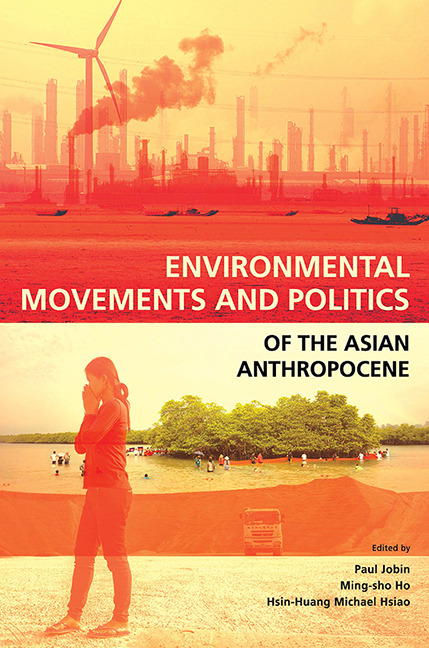Book contents
- Frontmatter
- Contents
- List of Tables, Maps and Figures
- Acknowledgements
- About the Contributors
- 1 Environmental Movements and Politics of the Asian Anthropocene: An Introduction
- 2 Environmental Movements in Taiwan’s Anthropocene: A Civic Eco-Nationalism
- 3 Environmental Movements in Post-handover Hong Kong: Between Managerialism and Radicalism
- 4 The Post-politics of Environmental Engagement in Singapore
- 5 Environmental Movements in the Philippines: Contestation for Justice in the Anthropocene
- 6 Environmental NGOs in “Post-New Order” Indonesia: Saving the Forests Through Democracy
- 7 Environmental Activism in Malaysia: Struggling for Justice from Indigenous Lands to Parliamentary Seats
- 8 State, NGOs, and Villagers: How the Thai Environmental Movement Fell Silent
- 9 Environmental Movements in Vietnam under One-Party Rule
- 10 The Cambodian Neopatrimonial State, Chinese Investments, and Anti-dam Movements
- 11 Conclusion: Environmental Movements and Political Regimes, or Why Democracy Still Matters in the Anthropocene
- Index
1 - Environmental Movements and Politics of the Asian Anthropocene: An Introduction
Published online by Cambridge University Press: 08 October 2021
- Frontmatter
- Contents
- List of Tables, Maps and Figures
- Acknowledgements
- About the Contributors
- 1 Environmental Movements and Politics of the Asian Anthropocene: An Introduction
- 2 Environmental Movements in Taiwan’s Anthropocene: A Civic Eco-Nationalism
- 3 Environmental Movements in Post-handover Hong Kong: Between Managerialism and Radicalism
- 4 The Post-politics of Environmental Engagement in Singapore
- 5 Environmental Movements in the Philippines: Contestation for Justice in the Anthropocene
- 6 Environmental NGOs in “Post-New Order” Indonesia: Saving the Forests Through Democracy
- 7 Environmental Activism in Malaysia: Struggling for Justice from Indigenous Lands to Parliamentary Seats
- 8 State, NGOs, and Villagers: How the Thai Environmental Movement Fell Silent
- 9 Environmental Movements in Vietnam under One-Party Rule
- 10 The Cambodian Neopatrimonial State, Chinese Investments, and Anti-dam Movements
- 11 Conclusion: Environmental Movements and Political Regimes, or Why Democracy Still Matters in the Anthropocene
- Index
Summary
Two decades ago, several authors of the present book contributed to a collective publication on Asia's environmental movements in comparative perspective (Lee and So 1999). As the editors pointed out (p. 15), while Western environmental movements developed in the context of advanced industrial economies and decades-old liberal democracies, their Asian counterparts emerged in either economically backward or newly industrializing countries, new democracies or authoritarian states. Distinct cultural and religious backgrounds have further shaped the specificities of environmentalism in Asia. The book therefore aimed to outline and compare the characteristics of Asia's environmental movements, and to examine their impact on the state, economy, and society—as well, of course, on environmental outcomes.
Around the same time, two other edited volumes attested to the effervescence of the academic attention to this range of topics in the context of East and Southeast Asia (Kalland and Persoon 1998; Hirsch and Warren 1998). The flourishing of bottom-up environmental activism reflected the quick pace of industrialization and an ascending position in the world economy. While social movements against industrial pollution in Japan started commenced in the late nineteenth century (Walker 2010; Stolz 2014), in the rest of Asia, similar movements did not appear until some hundred years later, starting with the “Four Asian Tigers” (South Korea, Taiwan, Hong Kong, and Singapore) in the 1970s; Thailand, the Philippines, and Malaysia in the 1980s; in China since the end of the 1990s; and still more recently in other countries, like Indonesia and Vietnam.
Our present collective volume examines how these popular protests engage with the environmental challenges in nine country-specific chapters, starting with Taiwan and Hong Kong for East Asia, then moving to Singapore, the Philippines, Indonesia, and Malaysia in maritime Southeast Asia, followed by Thailand, Vietnam, and Cambodia for the mainland area. The principal goal of the book is to present a qualitative assessment of how environmental movements have influenced the socio-politics of these countries and their environmental policies, and vice versa: how politics has influenced environmental movements.
The period covered focuses on the last two decades. Compared with the situation observed by Lee and So some twenty years ago, the state of the environment in the region—and indeed around the world—has not improved.
- Type
- Chapter
- Information
- Publisher: ISEAS–Yusof Ishak InstitutePrint publication year: 2021

